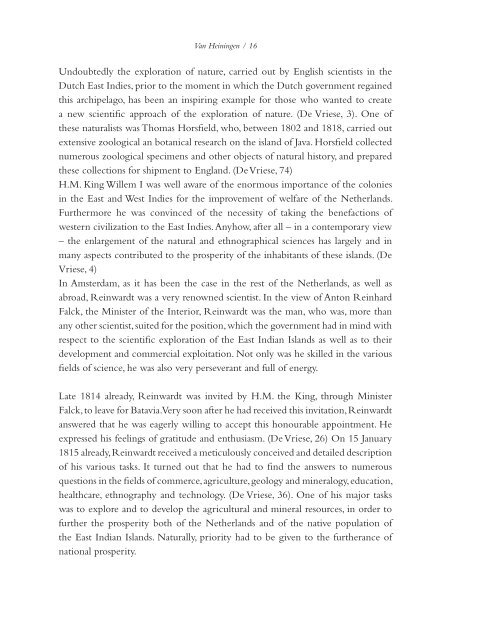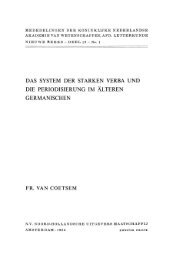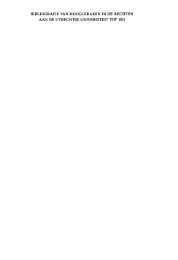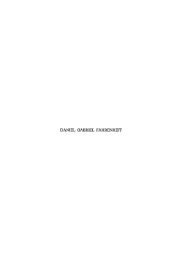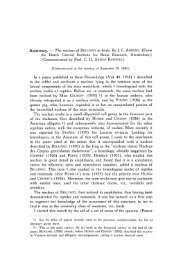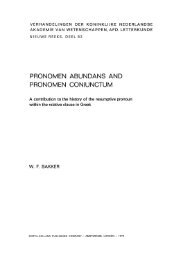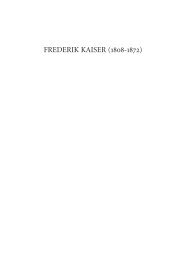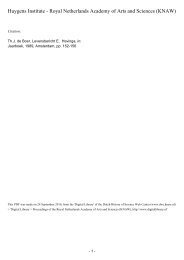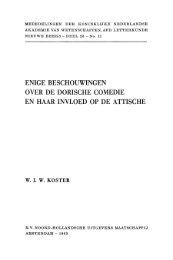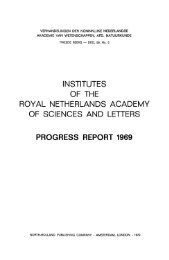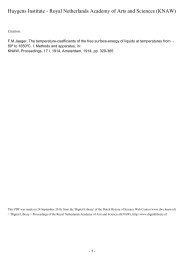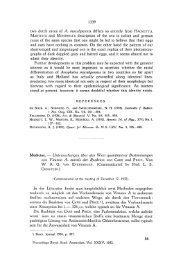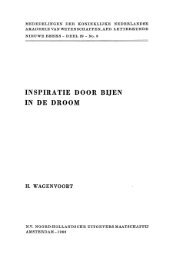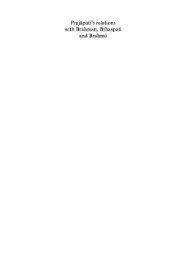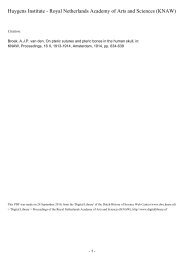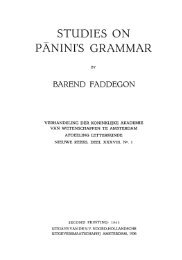- Page 1 and 2: Teunis Willem van Heiningen THE COR
- Page 3 and 4: CONTENTS VOLUME 1 INTRODUCTION 1 A
- Page 5 and 6: VOLUME 2 7 PART TWO: THE DUTCH EAST
- Page 7 and 8: INTRODUCTION This book is based on
- Page 9 and 10: RANH ‘National Archives, North-Ho
- Page 11 and 12: ABBREVIATIONS OF THE DISCIPLINES AN
- Page 13 and 14: CHAPTER 1 A SHORT BIOGRAPHY This sh
- Page 15: Correspondentie C.G. Reinwardt / 15
- Page 19 and 20: Correspondentie C.G. Reinwardt / 19
- Page 21 and 22: Correspondentie C.G. Reinwardt / 21
- Page 23 and 24: Correspondentie C.G. Reinwardt / 23
- Page 25 and 26: Correspondentie C.G. Reinwardt / 25
- Page 27 and 28: Correspondentie C.G. Reinwardt / 27
- Page 29 and 30: Correspondentie C.G. Reinwardt / 29
- Page 31 and 32: Correspondentie C.G. Reinwardt / 31
- Page 33 and 34: Correspondentie C.G. Reinwardt / 33
- Page 35 and 36: Correspondentie C.G. Reinwardt / 35
- Page 37: Correspondentie C.G. Reinwardt / 37
- Page 40 and 41: Van Heiningen / 40 B. Bataviaasche
- Page 43 and 44: CHAPTER 3 A COUPLE OF REINWARDT’S
- Page 45 and 46: Correspondentie C.G. Reinwardt / 45
- Page 47: Correspondentie C.G. Reinwardt / 47
- Page 50 and 51: Van Heiningen / 50 3. C.G.C. Reinwa
- Page 52 and 53: Van Heiningen / 52 to a few useful
- Page 54 and 55: Van Heiningen / 54 informed about t
- Page 56 and 57: 12. C.G.C. Reinwardt (Harderwijk) t
- Page 59 and 60: CHAPTER 5 - THE ‘AMSTERDAM’-PER
- Page 61 and 62: Correspondentie C.G. Reinwardt / 61
- Page 63 and 64: Sebald Justinus Brugmans (1763-1819
- Page 65 and 66: Correspondentie C.G. Reinwardt / 65
- Page 67 and 68:
Correspondentie C.G. Reinwardt / 67
- Page 69 and 70:
Correspondentie C.G. Reinwardt / 69
- Page 71 and 72:
Correspondentie C.G. Reinwardt / 71
- Page 73 and 74:
Correspondentie C.G. Reinwardt / 73
- Page 75 and 76:
Correspondentie C.G. Reinwardt / 75
- Page 77 and 78:
Correspondentie C.G. Reinwardt / 77
- Page 79 and 80:
Correspondentie C.G. Reinwardt / 79
- Page 81 and 82:
Correspondentie C.G. Reinwardt / 81
- Page 83 and 84:
Correspondentie C.G. Reinwardt / 83
- Page 85 and 86:
Correspondentie C.G. Reinwardt / 85
- Page 87 and 88:
Correspondentie C.G. Reinwardt / 87
- Page 89 and 90:
Correspondentie C.G. Reinwardt / 89
- Page 91 and 92:
Correspondentie C.G. Reinwardt / 91
- Page 93 and 94:
Correspondentie C.G. Reinwardt / 93
- Page 95 and 96:
Correspondentie C.G. Reinwardt / 95
- Page 97 and 98:
Correspondentie C.G. Reinwardt / 97
- Page 99 and 100:
Correspondentie C.G. Reinwardt / 99
- Page 101 and 102:
Correspondentie C.G. Reinwardt / 10
- Page 103 and 104:
Correspondentie C.G. Reinwardt / 10
- Page 105 and 106:
Correspondentie C.G. Reinwardt / 10
- Page 107 and 108:
Correspondentie C.G. Reinwardt / 10
- Page 109:
Correspondentie C.G. Reinwardt / 10
- Page 112 and 113:
Van Heiningen / 112 125. C.G.C. Rei
- Page 114 and 115:
Van Heiningen / 114 127. C.G.C. Rei
- Page 116 and 117:
Van Heiningen / 116 Capellen. He is
- Page 118 and 119:
Van Heiningen / 118 four cases fill
- Page 120 and 121:
Van Heiningen / 120 and friendship
- Page 122 and 123:
Van Heiningen / 122 ship is still s
- Page 124 and 125:
Van Heiningen / 124 142. C.G.C. Rei
- Page 126 and 127:
Van Heiningen / 126 Europe) cannot
- Page 128 and 129:
Van Heiningen / 128 the contents of
- Page 130 and 131:
Van Heiningen / 130 had to make the
- Page 132 and 133:
Van Heiningen / 132 return to Cape
- Page 134 and 135:
Van Heiningen / 134 have been. Mr.
- Page 136 and 137:
C.G.C. Reinwardt (Buitenzorg) to M.
- Page 138 and 139:
Van Heiningen / 138 has also brough
- Page 140 and 141:
taken with him from Holland, withou
- Page 142 and 143:
Van Heiningen / 142 many letters fr
- Page 144 and 145:
Van Heiningen / 144 promises Reinwa
- Page 146 and 147:
Van Heiningen / 146 to stay at ‘T
- Page 148 and 149:
Van Heiningen / 148 South-African b
- Page 150 and 151:
Van Heiningen / 150 His Majesty Rei
- Page 152 and 153:
Van Heiningen / 152 In addition to
- Page 154 and 155:
Van Heiningen / 154 He promises to
- Page 156 and 157:
Van Heiningen / 156 adds a life cer
- Page 158 and 159:
Van Heiningen / 158 He has decided
- Page 160 and 161:
Van Heiningen / 160 By doing so he
- Page 162 and 163:
Van Heiningen / 162 botanical trips
- Page 164 and 165:
Van Heiningen / 164 174. G. Drost (
- Page 166 and 167:
Van Heiningen / 166 be sent with an
- Page 168 and 169:
Van Heiningen / 168 skeleton and a
- Page 170 and 171:
Van Heiningen / 170 friend, will be
- Page 172 and 173:
Van Heiningen / 172 183. C.G.C. Rei
- Page 174 and 175:
Van Heiningen / 174 of his many occ
- Page 176 and 177:
Van Heiningen / 176 187. C.G.C. Rei
- Page 178 and 179:
Van Heiningen / 178 to accept that
- Page 180 and 181:
Van Heiningen / 180 Alexander von H
- Page 182 and 183:
Van Heiningen / 182 cases to Mr. Ab
- Page 184 and 185:
Van Heiningen / 184 his friend did
- Page 186 and 187:
Van Heiningen / 186 send nine cases
- Page 188 and 189:
Van Heiningen / 188 restitution. At
- Page 190 and 191:
Van Heiningen / 190 regime is the b
- Page 192 and 193:
Van Heiningen / 192 Kent is helping
- Page 194 and 195:
Van Heiningen / 194 202. M. van Mar
- Page 196 and 197:
Van Heiningen / 196 of this report
- Page 198 and 199:
Van Heiningen / 198 205. M. van Mar
- Page 200 and 201:
Van Heiningen / 200 207. M. van Mar
- Page 202 and 203:
Van Heiningen / 202 is educated in
- Page 204 and 205:
Van Heiningen / 204 problematic. Fi
- Page 206 and 207:
Van Heiningen / 206 ‘Amsterdam’
- Page 208 and 209:
Van Heiningen / 208 history. He fee
- Page 210 and 211:
Van Heiningen / 210 216. C.G.C. Rei
- Page 212 and 213:
Van Heiningen / 212 will be appoint
- Page 214 and 215:
Van Heiningen / 214 has also heard
- Page 216 and 217:
Van Heiningen / 216 224. G.F. Koch
- Page 218 and 219:
Van Heiningen / 218 228. C.G.C. Rei
- Page 220 and 221:
Van Heiningen / 220 has understood
- Page 222 and 223:
Van Heiningen / 222 about what Rein
- Page 224 and 225:
Van Heiningen / 224 234. C.G.C. Rei
- Page 226 and 227:
Van Heiningen / 226 236. M. van Mar
- Page 228 and 229:
Van Heiningen / 228 even been seen
- Page 230 and 231:
Van Heiningen / 230 ignorant about
- Page 232 and 233:
Van Heiningen / 232 Commercie’ (
- Page 234 and 235:
Van Heiningen / 234 potash and caus
- Page 236 and 237:
Van Heiningen / 236 M. van Marum (H
- Page 238 and 239:
Van Heiningen / 238 1 July 1817). P
- Page 240 and 241:
Van Heiningen / 240 travel to Lieut
- Page 242 and 243:
Van Heiningen / 242 which have been
- Page 244 and 245:
Van Heiningen / 244 it was only a c
- Page 246 and 247:
Van Heiningen / 246 month, so he ca
- Page 248 and 249:
Van Heiningen / 248 is convinced th
- Page 250 and 251:
Van Heiningen / 250 be elected memb
- Page 252 and 253:
Van Heiningen / 252 journey have be
- Page 254 and 255:
Van Heiningen / 254 the Governor-Ge
- Page 256 and 257:
Van Heiningen / 256 on which Elout
- Page 258 and 259:
Van Heiningen / 258 himself to the
- Page 260 and 261:
Van Heiningen / 260 and Colonies’
- Page 262 and 263:
Van Heiningen / 262 be his most imp
- Page 264 and 265:
Van Heiningen / 264 not know yet if
- Page 266 and 267:
Van Heiningen / 266 unknown objects
- Page 268 and 269:
Van Heiningen / 268 shipment of ric
- Page 270 and 271:
Van Heiningen / 270 to be adapted i
- Page 272 and 273:
Van Heiningen / 272 282. M. van Mar
- Page 274 and 275:
Van Heiningen / 274 286. J.Chr. Bau
- Page 276 and 277:
Van Heiningen / 276 From Reinwardt
- Page 278 and 279:
Van Heiningen / 278 der Capellen ha
- Page 280 and 281:
Van Heiningen / 280 letter from Lau
- Page 282 and 283:
Van Heiningen / 282 the sulphur lak
- Page 284 and 285:
Van Heiningen / 284 to Temminck, D
- Page 286 and 287:
Van Heiningen / 286 One of the boxe
- Page 288 and 289:
Van Heiningen / 288 299. C.G.C. Rei
- Page 290 and 291:
Van Heiningen / 290 the existence o
- Page 292 and 293:
Van Heiningen / 292 now.Therefore h
- Page 294 and 295:
Van Heiningen / 294 to finish it in
- Page 296 and 297:
Van Heiningen / 296 a remark about
- Page 298 and 299:
Van Heiningen / 298 Marum must acce
- Page 300 and 301:
Van Heiningen / 300 Dr Blume, his a
- Page 302 and 303:
Van Heiningen / 302 Reinwardt’s i
- Page 304 and 305:
Van Heiningen / 304 There is no mon
- Page 306 and 307:
Van Heiningen / 306 325. C.G.C. Rei
- Page 308 and 309:
Van Heiningen / 308 327. C.L. Blume
- Page 310 and 311:
Van Heiningen / 310 against larger
- Page 312 and 313:
Van Heiningen / 312 these are also
- Page 314 and 315:
Van Heiningen / 314 friend for his
- Page 316 and 317:
Van Heiningen / 316 346. Fr.A. Tref
- Page 318 and 319:
Van Heiningen / 318 Systema Naturae
- Page 320 and 321:
Van Heiningen / 320 collect a beaut
- Page 322 and 323:
Van Heiningen / 322 355. C.L. Blume
- Page 324 and 325:
Van Heiningen / 324 359. ?? Duyven
- Page 326 and 327:
Van Heiningen / 326 If his wife wou
- Page 328 and 329:
Van Heiningen / 328 fact that he di
- Page 330 and 331:
Van Heiningen / 330 Reinwardt propo
- Page 332 and 333:
Van Heiningen / 332 been wrecked an
- Page 334 and 335:
Van Heiningen / 334 continue sendin
- Page 336 and 337:
Van Heiningen / 336 shot the animal
- Page 338 and 339:
Van Heiningen / 338 a word of Dutch
- Page 340 and 341:
Van Heiningen / 340 370. Fr.A. Tref
- Page 342 and 343:
Van Heiningen / 342 which he will r
- Page 344 and 345:
Van Heiningen / 344 It would be bet
- Page 346 and 347:
Van Heiningen / 346 is very similar
- Page 348 and 349:
Van Heiningen / 348 Frederik’, wh
- Page 350 and 351:
Van Heiningen / 350 curse. They wil
- Page 352 and 353:
Van Heiningen / 352 the next occasi
- Page 354 and 355:
Van Heiningen / 354 still hampered
- Page 356 and 357:
Van Heiningen / 356 G. ten Cate (Ba
- Page 358 and 359:
Van Heiningen / 358 as a present un
- Page 360 and 361:
Van Heiningen / 360 He underlines h
- Page 362 and 363:
Van Heiningen / 362 has handled Rei
- Page 364:
Van Heiningen / 364 plants to other
- Page 368 and 369:
Digital series: Tools and Sources f
- Page 371 and 372:
CHAPTER 7 (Part 2) THE DUTCH EAST-I
- Page 373 and 374:
Correspondentie C.G. Reinwardt / 37
- Page 375 and 376:
Correspondentie C.G. Reinwardt / 37
- Page 377 and 378:
Correspondentie C.G. Reinwardt / 37
- Page 379 and 380:
Correspondentie C.G. Reinwardt / 37
- Page 381 and 382:
Correspondentie C.G. Reinwardt / 38
- Page 383 and 384:
Correspondentie C.G. Reinwardt / 38
- Page 385 and 386:
Correspondentie C.G. Reinwardt / 38
- Page 387 and 388:
Correspondentie C.G. Reinwardt / 38
- Page 389 and 390:
Correspondentie C.G. Reinwardt / 38
- Page 391 and 392:
Correspondentie C.G. Reinwardt / 39
- Page 393 and 394:
Correspondentie C.G. Reinwardt / 39
- Page 395 and 396:
Correspondentie C.G. Reinwardt / 39
- Page 397 and 398:
Correspondentie C.G. Reinwardt / 39
- Page 399 and 400:
Correspondentie C.G. Reinwardt / 39
- Page 401 and 402:
Correspondentie C.G. Reinwardt / 40
- Page 403 and 404:
Correspondentie C.G. Reinwardt / 40
- Page 405 and 406:
Correspondentie C.G. Reinwardt / 40
- Page 407 and 408:
Correspondentie C.G. Reinwardt / 40
- Page 409 and 410:
Correspondentie C.G. Reinwardt / 40
- Page 411 and 412:
Correspondentie C.G. Reinwardt / 41
- Page 413 and 414:
Correspondentie C.G. Reinwardt / 41
- Page 415 and 416:
Correspondentie C.G. Reinwardt / 41
- Page 417 and 418:
Correspondentie C.G. Reinwardt / 41
- Page 419 and 420:
Correspondentie C.G. Reinwardt / 41
- Page 421 and 422:
Correspondentie C.G. Reinwardt / 42
- Page 423 and 424:
Correspondentie C.G. Reinwardt / 42
- Page 425 and 426:
Correspondentie C.G. Reinwardt / 42
- Page 427 and 428:
Correspondentie C.G. Reinwardt / 42
- Page 429 and 430:
Correspondentie C.G. Reinwardt / 42
- Page 431 and 432:
Correspondentie C.G. Reinwardt / 43
- Page 433 and 434:
Correspondentie C.G. Reinwardt / 43
- Page 435 and 436:
Correspondentie C.G. Reinwardt / 43
- Page 437 and 438:
Correspondentie C.G. Reinwardt / 43
- Page 439 and 440:
Correspondentie C.G. Reinwardt / 43
- Page 441 and 442:
Correspondentie C.G. Reinwardt / 44
- Page 443 and 444:
Correspondentie C.G. Reinwardt / 44
- Page 445 and 446:
Correspondentie C.G. Reinwardt / 44
- Page 447 and 448:
Correspondentie C.G. Reinwardt / 44
- Page 449 and 450:
Correspondentie C.G. Reinwardt / 44
- Page 451 and 452:
Correspondentie C.G. Reinwardt / 45
- Page 453 and 454:
Correspondentie C.G. Reinwardt / 45
- Page 455 and 456:
Correspondentie C.G. Reinwardt / 45
- Page 457 and 458:
Correspondentie C.G. Reinwardt / 45
- Page 459:
Correspondentie C.G. Reinwardt / 45
- Page 462 and 463:
Van Heiningen / 462 respect to that
- Page 464 and 465:
Van Heiningen / 464 but Weber seems
- Page 466 and 467:
Van Heiningen / 466 However because
- Page 468 and 469:
Van Heiningen / 468 542. A. Payen (
- Page 470 and 471:
Van Heiningen / 470 Van der Capelle
- Page 472 and 473:
Van Heiningen / 472 546. C.G.C. Rei
- Page 474 and 475:
Van Heiningen / 474 botanical objec
- Page 476 and 477:
Van Heiningen / 476 552. C.G.C. Rei
- Page 478 and 479:
Van Heiningen / 478 Karl (or Carl)
- Page 480 and 481:
Van Heiningen / 480 facts in the fi
- Page 482 and 483:
Van Heiningen / 482 show him how mu
- Page 484 and 485:
Van Heiningen / 484 Van der Capelle
- Page 486 and 487:
Van Heiningen / 486 which has broke
- Page 488 and 489:
Van Heiningen / 488 among others th
- Page 490 and 491:
Van Heiningen / 490 569. G. Vrolik
- Page 492 and 493:
Van Heiningen / 492 575. A. von Zan
- Page 494 and 495:
Van Heiningen / 494 577. Directors
- Page 496 and 497:
Van Heiningen / 496 - Letter from t
- Page 498 and 499:
Van Heiningen / 498 586. C.G.C. Rei
- Page 500 and 501:
Van Heiningen / 500 to these animal
- Page 502 and 503:
Van Heiningen / 502 595. G. Vrolik
- Page 504 and 505:
Van Heiningen / 504 601. Chr.F. Sch
- Page 506 and 507:
Van Heiningen / 506 Governor-Genera
- Page 508 and 509:
Van Heiningen / 508 606. C.G.C. Rei
- Page 510 and 511:
Van Heiningen / 510 610. C.G.C. Rei
- Page 512 and 513:
Van Heiningen / 512 awarded, after
- Page 514 and 515:
Van Heiningen / 514 introduction to
- Page 516 and 517:
Van Heiningen / 516 619. G. Vrolik
- Page 518 and 519:
Van Heiningen / 518 possible to det
- Page 520 and 521:
Van Heiningen / 520 631. C. Bailly
- Page 522 and 523:
Van Heiningen / 522 not able to exp
- Page 524 and 525:
Van Heiningen / 524 cargo on to Bat
- Page 526 and 527:
Van Heiningen / 526 644. P.N. Quarl
- Page 528 and 529:
Van Heiningen / 528 He assumes that
- Page 530 and 531:
Van Heiningen / 530 he has carried
- Page 532 and 533:
Van Heiningen / 532 also refers to
- Page 534 and 535:
Van Heiningen / 534 656. A. von Hum
- Page 536 and 537:
Van Heiningen / 536 662. C.G.C. Rei
- Page 538 and 539:
Van Heiningen / 538 664. C.G.C. Rei
- Page 540 and 541:
Van Heiningen / 540 especially deal
- Page 542 and 543:
Van Heiningen / 542 professional li
- Page 544 and 545:
Van Heiningen / 544 676. C.G.C. Rei
- Page 546 and 547:
Van Heiningen / 546 With respect to
- Page 548 and 549:
Van Heiningen / 548 own devise on t
- Page 550 and 551:
Van Heiningen / 550 document. Besid
- Page 552 and 553:
Van Heiningen / 552 the exterior of
- Page 554 and 555:
Van Heiningen / 554 who had an almo
- Page 556 and 557:
Van Heiningen / 556 696. C.G.C. Rei
- Page 558 and 559:
Van Heiningen / 558 inform him abou
- Page 560 and 561:
Van Heiningen / 560 705. C.G.C. Rei
- Page 562 and 563:
Van Heiningen / 562 lot from these
- Page 564 and 565:
Van Heiningen / 564 which one taill
- Page 566 and 567:
Van Heiningen / 566 treatises for a
- Page 568 and 569:
Van Heiningen / 568 he informs him
- Page 570 and 571:
Van Heiningen / 570 721. C.G.C. Rei
- Page 572 and 573:
Van Heiningen / 572 727. G. Vrolik
- Page 574 and 575:
Van Heiningen / 574 731. C.G.C. Rei
- Page 576 and 577:
Van Heiningen / 576 735. Edward T.
- Page 578 and 579:
Van Heiningen / 578 and as incompre
- Page 580 and 581:
Van Heiningen / 580 fromVan Marum,
- Page 582 and 583:
Van Heiningen / 582 in Leyden, he a
- Page 584 and 585:
Van Heiningen / 584 ‘diamantspaat
- Page 586 and 587:
Van Heiningen / 586 equalled them.T
- Page 588 and 589:
Van Heiningen / 588 C.G.C. Reinward
- Page 590 and 591:
Van Heiningen / 590 ‘stuivers’
- Page 592 and 593:
Van Heiningen / 592 768. C.G.C. Rei
- Page 594 and 595:
Van Heiningen / 594 within a couple
- Page 596 and 597:
Van Heiningen / 596 does not like t
- Page 598 and 599:
Van Heiningen / 598 777. C.G.C. Rei
- Page 600 and 601:
Van Heiningen / 600 unknown in Euro
- Page 602 and 603:
Van Heiningen / 602 Van Marum’s a
- Page 604 and 605:
Van Heiningen / 604 need to explain
- Page 606 and 607:
Van Heiningen / 606 be very difficu
- Page 608 and 609:
Van Heiningen / 608 Therefore he ad
- Page 610 and 611:
Van Heiningen / 610 of the‘Maatsc
- Page 612 and 613:
Van Heiningen / 612 801. M. van Mar
- Page 614 and 615:
Van Heiningen / 614 couple of other
- Page 616 and 617:
Van Heiningen / 616 809. C.G.C. Rei
- Page 618 and 619:
Van Heiningen / 618 Müller’s let
- Page 620 and 621:
Van Heiningen / 620 817. C.F.H. von
- Page 622 and 623:
Van Heiningen / 622 a new species),
- Page 624 and 625:
Van Heiningen / 624 and General Van
- Page 626 and 627:
Van Heiningen / 626 Van den Ende.Va
- Page 628 and 629:
Van Heiningen / 628 831. P.W. Korth
- Page 630 and 631:
Van Heiningen / 630 from each other
- Page 632 and 633:
Van Heiningen / 632 it. Again he ad
- Page 634 and 635:
Van Heiningen / 634 842. C.G.C. Rei
- Page 636 and 637:
Van Heiningen / 636 847. C.G.C. Rei
- Page 638 and 639:
Van Heiningen / 638 He points at an
- Page 640 and 641:
Van Heiningen / 640 854. C.G.C. Rei
- Page 642 and 643:
Van Heiningen / 642 859. M. van Mar
- Page 644 and 645:
Van Heiningen / 644 that having don
- Page 646 and 647:
Van Heiningen / 646 868. C. Alewijn
- Page 648 and 649:
Van Heiningen / 648 is coherent. In
- Page 650 and 651:
Van Heiningen / 650 successful jour
- Page 652 and 653:
Van Heiningen / 652 has to be made
- Page 654 and 655:
Van Heiningen / 654 a modest financ
- Page 656 and 657:
Van Heiningen / 656 immortal master
- Page 658 and 659:
Van Heiningen / 658 896. C.G.C. Rei
- Page 660 and 661:
Van Heiningen / 660 Vrolik wants to
- Page 662 and 663:
Van Heiningen / 662 defective theor
- Page 664 and 665:
Van Heiningen / 664 collected durin
- Page 666 and 667:
Van Heiningen / 666 bulbous plants
- Page 668 and 669:
Van Heiningen / 668 The commission
- Page 670 and 671:
Van Heiningen / 670 of high esteem
- Page 672 and 673:
Van Heiningen / 672 Northern Nether
- Page 674 and 675:
Van Heiningen / 674 935. W. Vrolik
- Page 676 and 677:
Van Heiningen / 676 939. J.G.S. van
- Page 678 and 679:
Van Heiningen / 678 a number of obj
- Page 680 and 681:
Van Heiningen / 680 one. Reinwardt
- Page 682 and 683:
Van Heiningen / 682 951. C.G.C. Rei
- Page 684 and 685:
Van Heiningen / 684 him about Mrs.
- Page 686 and 687:
Van Heiningen / 686 during his stay
- Page 688 and 689:
Van Heiningen / 688 963. C.G.C. Rei
- Page 690 and 691:
Van Heiningen / 690 analysis of the
- Page 692 and 693:
Van Heiningen / 692 plant. Therefor
- Page 694 and 695:
Van Heiningen / 694 977. ?? Van der
- Page 696 and 697:
Van Heiningen / 696 have meanwhile
- Page 698 and 699:
Van Heiningen / 698 vascular system
- Page 700 and 701:
Van Heiningen / 700 he can only ext
- Page 702 and 703:
Van Heiningen / 702 quoting his sou
- Page 704 and 705:
Van Heiningen / 704 995. K.Fr.Ph. v
- Page 706 and 707:
Van Heiningen / 706 species are alr
- Page 708 and 709:
Van Heiningen / 708 Amsterdam. He h
- Page 710 and 711:
Van Heiningen / 710 Within shortly
- Page 712 and 713:
Van Heiningen / 712 1009. C.G.C. Re
- Page 714 and 715:
Van Heiningen / 714 1016. K.Fr.Ph.
- Page 716 and 717:
Van Heiningen / 716 Sieber, Preiss,
- Page 718 and 719:
Van Heiningen / 718 judgement. So t
- Page 720 and 721:
Van Heiningen / 720 1031. C.G.C. Re
- Page 722 and 723:
Van Heiningen / 722 compared the go
- Page 724 and 725:
Van Heiningen / 724 affection and i
- Page 726 and 727:
Van Heiningen / 726 author’s argu


